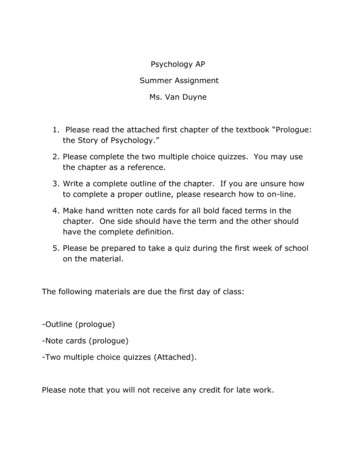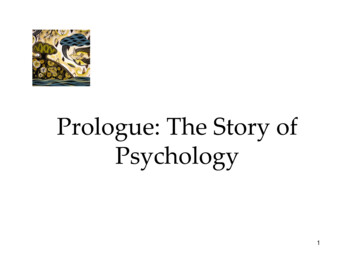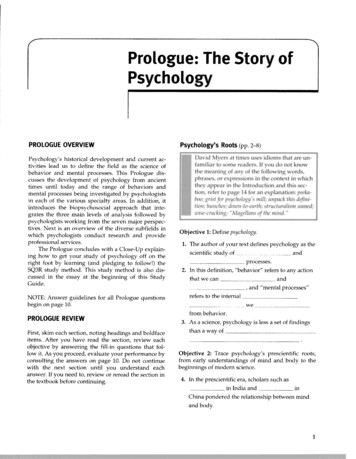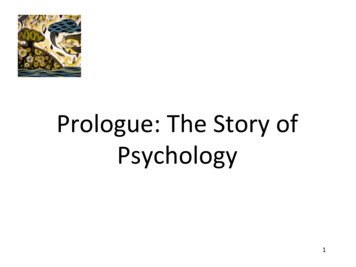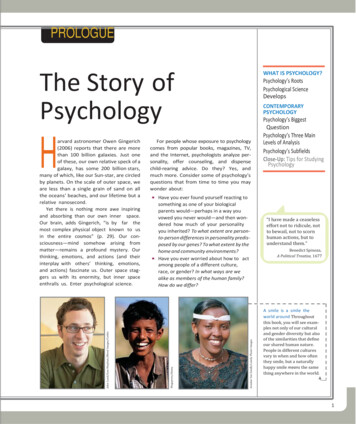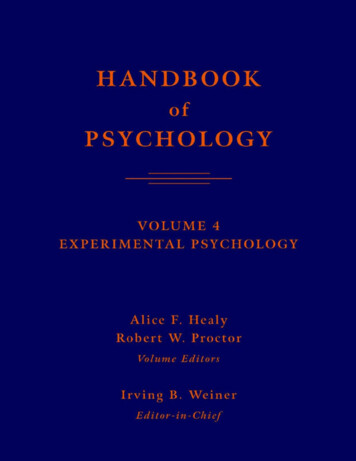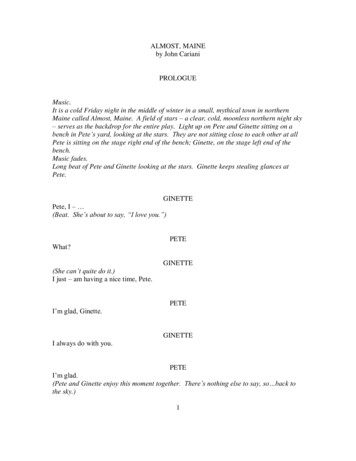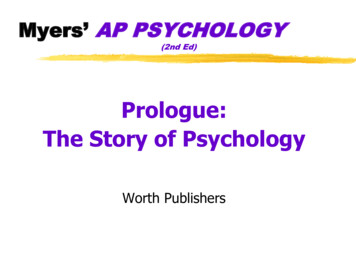
Transcription
Myers’ AP PSYCHOLOGY(2nd Ed)Prologue:The Story of PsychologyWorth Publishers
Psychology has Greek roots Psyche means “mind” and is separate &distinct from the physical body. “ology”is a field of study, the”study ofthe mind”
Prologue:Psychology’s Roots Psychological Science Is Born Empiricism Knowledge comes from experience viathe senses Science flourishes through observationand experiment
What is Psychology? Definition: The scientific study ofbehavior & mental processes. Psychology is a science that seeks toanswer questions about: how we thinkfeel and act. The goals of psychology are to:observe, predict and control or modify behaviorand/or mental processes.
What is behavior?-Anything an organism does any actionthat we can observe & record. (what yousee a person do)What do we mean by mental processes?-the internal subjective experiences we inferfrom behavior, sensations, perceptions,emotions, dreams, thoughts & beliefs.
Psychology’s RootsPrescientific Psychology Is the mind connectedto the body or distinct? Are ideas inborn or isthe mind a blank slatefilled by experience?
Prologue:Psychology’s Roots
Psychology’s Roots Wilhelm Wundtopened the firstpsychologylaboratory at theUniversity ofLiepzig, Germany(c.Dec. 1879)
Psychology’s FirstExperiment He created an experimental apparatusthat was used to measure the time lagbetween a person hearing a ball hit aplatform and their pressing a telegraphkey. Wundt was seeking to measure the“atoms of the mind”
Key People in the Originof Psychology Wilhelm Wundt”Father ofPsychology”Structuralism usedintrospection(looking in) toexplore theelemental structureof the human mind
Key People in the Origin ofPsychology Edward Titchner: (1867-1927) A student of Wundt Created Structuralism
William James1842-1910 Functionalismfocused on howbehavioralprocessesfunction- howthey enableorganism toadapt, survive,and flourish
William James1842-1910 First American psychologist Author of first psychology textbook in1890, called Principles of Psychology Harvard University philosopher &psychologist Created Functionalism
G. Stanley Hall 1844-1924 Receives from Harvard, the first PHD inpsychology Established the first Psych lab in the U.S.at John Hopkins University Founded in 1892 the APA and was thefirst president. Student of Wundt
Mary Whiton Calkins1863-1930 Student of James 1905-was first female president of APA Harvard refused her PHD degree inPsychology, offered it from Radcliffe Did research in dreams, memory &personality.
Margaret Floy Washburn1871-1939-First woman to get a PHD in psychologyfrom Cornell University.-Student of Titchner-Second female president of the APA in1921- Wrote The Animal Mind in which shesynthesized animal behavior from humanbehavior
Gestalt Psychology Founded by Max Wertheimer as a revolt againstWundt. Gestalt is a German word that means: whole orconfiguration. Instead of analyzing the elementsof consciousness, you must study the individualelements of the entire experience togetherwhich creates something new & different. “The whole is different from the sum of itsparts.” Perception, insight & problem-solving. Movement died during Nazi Germany in 1930’s.
Sigmund Freud 1856-1939 Founded Psychoanalysis School of thought that focused on howbehavior & our problems are a result ofunresolved childhood conflicts of whichwe are unaware of. Also a form of treatment for abnormalbehavior.
Ivan Pavlov Behaviorist Discovered Classical Conditioning ( a typeof learning. Learning by association) Conditioned dogs to salivate when theyheard a bell
John Watson Founded Behaviorism-which is a schoolof thought that focuses on how we learnby studying only observable responses. Psychology should only study what can beobserved & measured scientifically.
B. F. Skinner Behaviorist Developed Operant Conditioning Using reinforcement & consequences toshape behaviors
Abraham Maslow 1908-1970andCarl Rogers 1902-1987 Founded Humanism a school of thoughtthat focuses on the study of the consciousexperience, the individual’s right of choiceand capacity for personal growth. People strive to reach their potential or“self-actualization”.
Psychology’s Big IssuesNature-nurture controversy the relative contribution thatgenes and experience make todevelopment of psychologicaltraits and behaviors
Psychology’s Big Issues Stability vs. Change - do our traitschange as we age or do we stay thesame? Rationality vs. Irrationality –whatcauses our minds to error?
Perspectives inPsychology Natural selection principle that thoseinherited traitvariationscontributing tosurvival will mostlikely be passed onto succeedinggenerations
Psychological Approaches Biological Psychoanalytic Psychodynamic Behavioral Evolutionary Cognitive Humanistic Socio-Cultural Biopsychosocial
Psychology’s Subfields Basic Research Increase scientific knowledge base. Applied Research Scientific study to solve practical problems
Psychology’s Subfields Developmental – study of howmental process & behavior changes aswe age Educational – study of howpsychological processes affect teachingand learning Personality – study of an individual’scharacteristic pattern of thinking,feeling, and acting
Psychology’s Subfields Social – how our behavior and mentalprocesses are impacted by the peoplearound us Industrial – Organizational (I/O) –study of how to improve humanperformance in the workplace Human Factors – study of how humansinteract with machines and the physicalenvironment in the workplace
Psychology’s Subfields Counseling– assists people with problemsin living or to help achieve greater wellbeing Clinical – assess and treats mental,emotional, and behavioral disorders Psychometrics – testing (IQ tests, etc) Psychiatry – branch of medicine thataddresses psychological disorders withmedical treatments. Requires a medicaldegree
What is Psychology? Definition: The scientific study of behavior & mental processes. Psychology is a science that seeks to answer questions about: how we think feel and act. The goals of psychology are to: observe, predict and control or modify behavior and/or mental processes.
